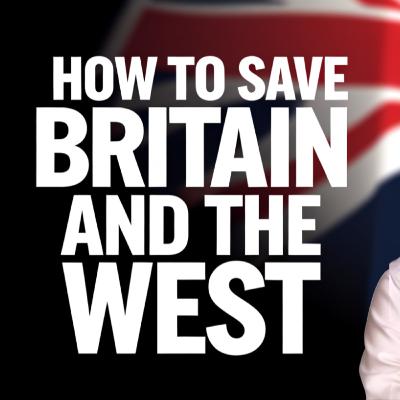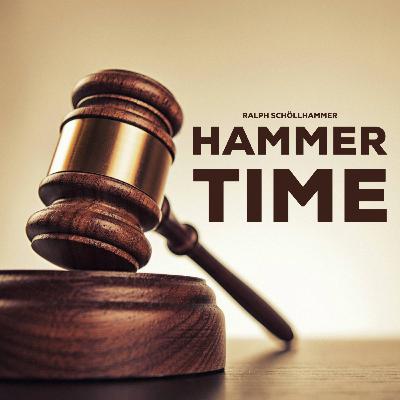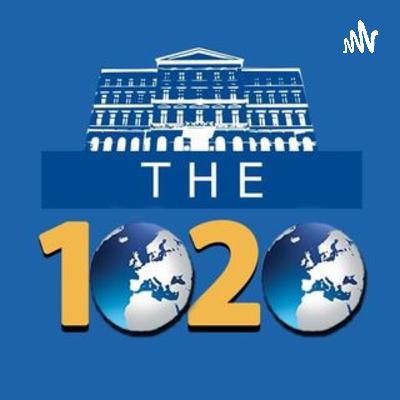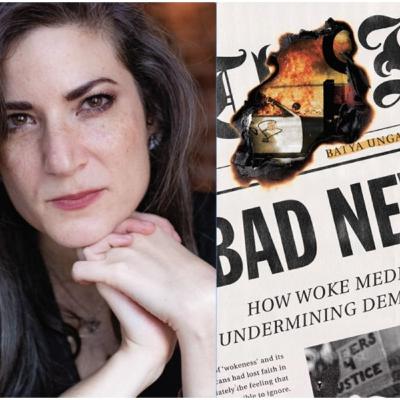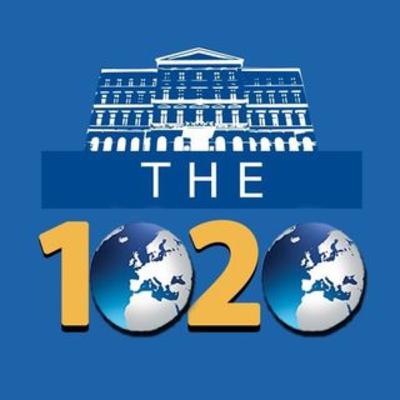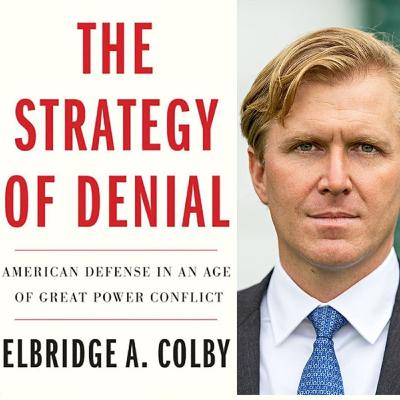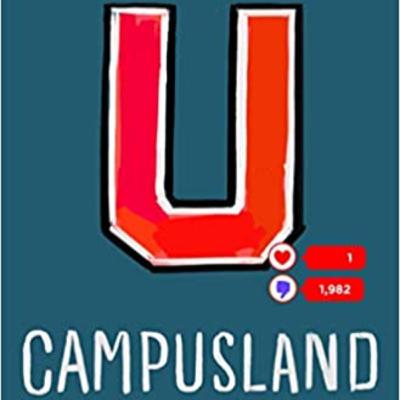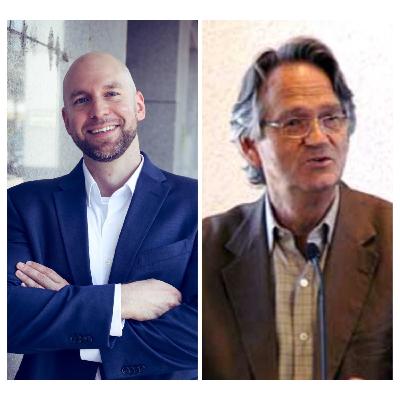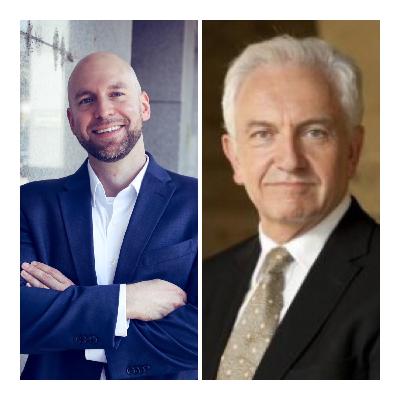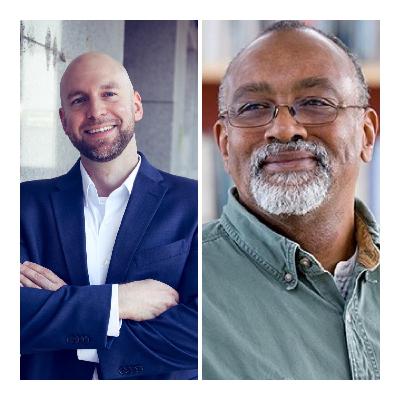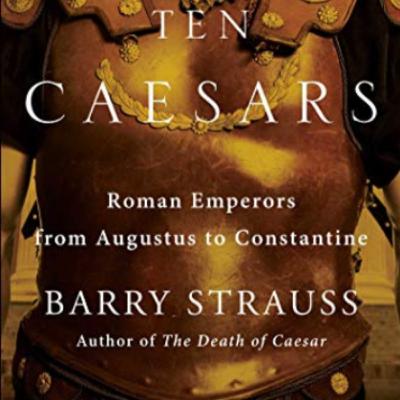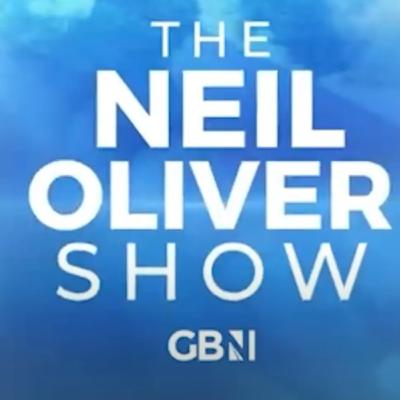Discover "Hammer Time" with Ralph Schoellhammer
"Hammer Time" with Ralph Schoellhammer

"Hammer Time" with Ralph Schoellhammer
Author: Ralph Schoellhammer
Subscribed: 24Played: 269Subscribe
Share
© Ralph Schoellhammer
Description
Hammer Time is a news podcast that features interviews with some of the most influential thinkers of our time. This podcast discusses everything that pertains to the everyday rough-and-tumble of global politics, from arts to philosophy to pop culture. Please subscribe and follow our updates on Twitter via @Raphfel and check out our YouTube Channel.
48 Episodes
Reverse
Get 50% off on the Biogena One Starter Pack with START50 at https://biogena-one.com/enRalph's German Channel: / @ralphschoellhammer-de Ralph's Substack in English: https://the1020.substack.com/Ralph's Substack in German: https://schoellhammer.substack.com/In this conversation, the Ralph and Neil delve into pressing geopolitical issues, focusing on the India-Pakistan conflict, the implications of historical context on current events, and the role of national identity in shaping global politics. They discuss the shifting dynamics of power, the risks of escalating conflicts, and the importance of understanding history in navigating contemporary challenges. In this conversation, the speakers discuss the current state of societal identity crises, the institutional crises leading to a pre-revolutionary phase in the UK and beyond, and the global shift from a unipolar to a multipolar world. They explore political changes in Africa, the role of leadership in development, and the implications of BRICS for global cooperation. The conversation also touches on the future of American influence and the significance of the new American pope in the context of Catholicism.Chapters00:00 Introduction to Geopolitical Developments02:12 The India-Pakistan Conflict: A Tectonic Shift12:12 Historical Context and Its Impact on Current Events22:20 The Role of National Identity in Global Politics29:06 Reprogramming Society: The Crisis of Identity30:51 Pre-Revolutionary Phase: Institutional Crisis in the UK and Beyond34:14 Global Instability: The Shift from Unipolar to Multipolar World36:12 Emerging Alternatives: Political Changes in Africa39:11 The Role of Leadership: Dictatorship vs. Democracy in Development42:44 The Changing Landscape: BRICS and Global Cooperation50:04 The Future of American Influence: A Shift in Strategy55:07 The American Pope: A New Era for Catholicism?
Get 50% off on the Biogena One Starter Pack with START50 at https://biogena-one.com/enRalph's German Channel: / @ralphschoellhammer-de Ralph's Substack in English: https://the1020.substack.com/Ralph's Substack in German: https://schoellhammer.substack.com/Interview with David Betz: • "The coming civil war with David Betz" Interview with Doomberg and Michael Every: • The New World Order – with Doomberg a... Ralph Schoellhammer discusses the potential for a coming revolution in the West, driven by an institutional crisis where existing political frameworks fail to adapt to contemporary challenges. He emphasizes the importance of political legitimacy, voter frustration, and the role of youth in seeking change. The conversation explores historical parallels and the uncertain future of political order amidst rising discontent.Takeaways• The West is facing an institutional crisis that threatens democracy.• Existing political institutions are failing to adapt to new challenges.• Voter frustration is leading to a loss of legitimacy in political systems.• Youth engagement in politics is increasing as they seek alternatives.• Historical revolutions were often preceded by significant institutional crises.• The current political landscape is marked by a desire for change.• Adaptation of institutions is crucial for preserving democracy.• Crackdowns on dissent are not sustainable solutions to political discontent.• The future political order is uncertain and may vary by region.• The conversation aims to spark dialogue about pressing political issues.Chapters1. 00:00 Introduction and Announcements2. 02:22 The Coming Revolution in the West3. 06:28 Institutional Crisis and Adaptation4. 12:07 Political Legitimacy and Voter Frustration5. 18:35 The Role of Youth in Political Change6. 24:04 The Future of Order and Change
Ralph Schoellhammer, Michael Every, and Doomberg discuss the current economic and geopolitical challenges. They analyze the role of #GDP , the geopolitical tensions between the #us and #china , and the impact of the #trump administration on global #politics They also discuss the situation in #canada and the importance of #energy and resources in the political landscape.
Ralph Schoellhammer, senior lecturer in economics and political science at Webster University Vienna, talks to Brendan O'Neill about the green delusions of the elites, why energy is so crucial to prosperity and why the populist revolt is just getting started.
Read spiked here: https://www.spiked-online.com/
This is the audio version of a Twitter Space done with Albert Marko and Elbridge Colby on the current state of Geopolitics.
In today’s episode Ralph speaks with Newsweek’s deputy opinion editor Batya Ungar-Sargon (make sure to follow her on Twitter @bungarsargon) about the state of the Western working class, how elitism in the media has become a threat to democracy, and why Donald Trump might have enduring appeal.
Ms. Ungar-Sargon has published her first book “Bad News: How Woke Media is Undermining Democracy” in October 2021. You can get it on Amazon and other booksellers (I highly recommend you do) and on May 10th the audiobook read by the author herself will be available as well.
In her book she describes how the Media shifted from being critical of those who held powerful positions in society to becoming part of the very powerful elites they were supposed to be critical of. Under the guise of culture wars Ms. Ungar-Sargon detects an actual class conflict that is deliberately (albeit maybe also unconsciously) obfuscated by focusing on cultural issues.
he has written for the New York Times, the Washington Post, Foreign Policy, Newsweek, the New York Review of Books Daily, and other publications. She has appeared numerous times on MSNBC, NBC, the Brian Lehrer Show, NPR, and at other media outlets.
Gray Connolly is a Barrister-at-Law in Sydney, Australia. His practice is mainly in constitutional law, public law, as well as corporations and resources law, and Gray has advised the Australian Government on national security and public law matters. Gray served previously as a naval intelligence officer in the Royal Australian Navy in the South China Sea, the Indian Ocean, the Arabian Sea, the Gulf of Oman, the Persian Gulf, East Timor, and the Middle East, including service in the wars in Iraq and Afghanistan. Gray also periodically writes on national security and governance matters from a conservative perspective. He writes at “Strategy Counsel” and his Twitter is @GrayConnolly - all of Gray's comments are Gray's alone!
In today's Episode Ralph speaks with Elbridge A. Colby (@ElbridgeColby on Twitter).
Mr. Colby is the co-founder and principal of The Marathon Initiative, a policy initiative focused on developing strategies to prepare the United States for an era of sustained great power competition. He is the author of The Strategy of Denial: American Defense in an Age of Great Power Conflict (Yale University Press), which The Wall Street Journal selected as one of the top ten books of 2021.
Colby’s work has appeared in outlets such as The Wall Street Journal, Foreign Affairs, The Washington Post, The New York Times, Foreign Policy, and The National Interest as well as in international outlets such as Asahi Shimbun, Yomiuri Shimbun, Nikkei Asia, The Hindustan Times, The Australian, Süddeutsche Zeitung, Frankfurter Allgemeine Zeitung, Internationale Politik, Die Zeit, Le Figaro, The Spectator, Survival, La Stampa, The Taipei Times, Hankook Ilbo, The New Straits Times, and The Manila Standard. He is also the author of many book chapters, reports, and articles on defense and foreign policy issues. He has testified a number of times before Congress and the U.S.-China Economic and Security Review Commission. Colby is a recipient of the Distinguished and Exceptional Public Service Awards from the Department of Defense and of the Superior and Meritorious Honor Awards from the Department of State. A member of the Council on Foreign Relations and the International Institute of Strategic Studies, Colby is a graduate of Harvard College and Yale Law School.
In today’s episode of the Global Wire Conversation I am speaking to Scott C. Johnston about his novel “Campusland,” what is going on in schools and universities and if humor is the best way to fight back.
Mr. Johnston is not only a prolific author (you can find his book here– and should get it. It’s a prescient and extremely entertaining read) but also runs his own blog at http://thenakeddollar.blogspot.com/and you can follow him on Twitter at @SJohnston60
Check out other episodes of the global wire conversations everywhere you listen to podcasts.
In today's conversation Ralph speaks with Professor Anthony Pagden of UCLA about his writings as well as the future of the European Idea and European Identity. This conversation is also available as a podcast on all platforms and as a video on YouTube - you can find them here https://anchor.fm/global-wire
Please subscribe so we can continue to produce high-quality content!
Anthony Pagden was educated in Santiago (Chile) London, Barcelona and Oxford and holds a B.A.. M.A. and D.Phil. from the University of Oxford. He has been a Fellow of Merton College, Oxford, Senior Research Fellow of the Warburg Institute (London), Professor of History at the European University Institute (Florence), University Reader in Intellectual History and Fellow of King’s College, Cambridge and the Harry C. Black Professor of History at Johns Hopkins. His research has concentrated on the relationship, cultural, political and legal, between the peoples of Europe and its overseas settlements and those of the non-European world from the Atlantic to the Pacific. His main concern is in the political theory of empire, in how the West sought to explain to itself how and why it had come to dominate so much of the world, and in the present consequences of the erosion of that domination. He has also written widely about cosmopolitanism, nationalism, internationalism and about the history and the future of the European Union. He is the author of more than a dozen books many of which have been translated into a number of European and Asian languages. His most recent publications include The Enlightenment – and why it still matters (Random House and Oxford University Press) in 2013, and in 2015, The Burdens of Empire: 1539 to the Present (Cambridge University Press). He has also written for the New Republic, the National Interest the New York Times, the Los Angeles Times, El Pais (Spain) Il Sole 24 Ore (Italy) the London Review of Books and the Times Literary Supplement. He teaches classes in the history of political thought from the sixteenth to the nineteenth century, in the theory of international relations, and seminars on imperialism and nationalism and on the theory of racism and ethnicity since antiquity.
In today's conversation, Ralph talks to professor Russell Berman about the global pandemic, the future of the European Union, Campus&Cancel Culture and political Islam. You can also find this conversation on YouTube at https://www.youtube.com/channel/UC3mxvf7TXw5YfadBmBqGxAg
Russell A. Berman, the Walter A. Haas Professor in the Humanities at Stanford University, is a senior fellow at the Hoover Institution and a co-chair of the Working Group on Islamism and the International Order.
Berman specializes in the study of German literary history and cultural politics. He is a member of both the Department of German Studies and the Department of Comparative Literature at Stanford. He has served in numerous administrative positions at Stanford.
He is the author of numerous articles and books including Enlightenment or Empire: Colonial Discourse in German Culture (1998) and The Rise of the Modern German Novel: Crisis and Charisma (1986), both of which won the Outstanding Book Award of the German Studies Association (in 2000 and 1987, respectively). Hoover Institution Press published his books In Retreat: America's Withdrawal from the Middle East (2014), Freedom or Terror: Europe Faces Jihad (2010), and Anti-Americanism in Europe: A Cultural Problem (2004). His other books include Fiction Sets You Free: Literature, Liberty, and Western Culture (2007), Cultural Studies of Modern Germany: Representation and Nationhood (1993), Modern Culture and Critical Theory: Art, Politics, and the Legacy of the Frankfurt School (1989), and Between Fontane and Tucholsky: Literary Criticism and the Public Sphere in Wilhelmine Germany (1983). He has also published numerous articles in the Hoover Digest, most recently "Marx’s Moldering Manifesto" (fall 2018). His writings have also appeared in Defining Ideas and Advancing a Free Society.
In today's conversation, Ralph talks to professor Glenn Loury about race, culture and economics. You can also find this conversation on our YouTube Channel.
Glenn C. Loury is the Merton P. Stoltz Professor of the Social Sciences and Professor of Economics at Brown University. He has taught previously at Boston, Harvard and Northwestern Universities, and the University of Michigan. As a prominent social critic and public intellectual, writing mainly on the themes of racial inequality and social policy, Professor Loury has published over 200 essays and reviews in journals of public affairs in the U.S. and abroad. He is a member of the Council on Foreign Relations, is a contributing editor at The Boston Review, and was for many years a contributing editor at The New Republic. Professor Loury’s books include One by One, From the Inside Out: Essays and Reviews on Race and Responsibility in America (The Free Press, 1995 – winner of the American Book Award and the Christianity Today Book Award); The Anatomy of Racial Inequality (Harvard University Press, 2002); Ethnicity, Social Mobility and Public Policy: Comparing the US and the UK (ed., Cambridge University Press, 2005); and, Race, Incarceration and American Values (M.I.T. Press, 2008).
You can follow Professor Loury's commentary on "The Glenn Show" on bloggingheads.tv and also follow him on twitter https://twitter.com/GlennLoury
In today’s episode I will talk with Dr. Barry Strauss about the madness and genius of Roman Emperors, how Western civilization might never have emerged if the Persian Wars would have ended differently, and what it all means for today.
Barry S. Strauss is a historian and Professor of History and Classics at Cornell University. He is an expert on ancient military history and has written numerous books, including The Battle of Salamis (2004), The Trojan War (2006), The Spartacus War (2009), Masters of Command (2013), and The Death of Caesar (2015). His books have been translated into sixteen languages.
His most recent book is “Ten Caesars: Roman Emperors from Augustus to Constantine” in which professor Strauss takes a closer look at 10 out of Ancient Rome’s over 60 imperial rulers. In addition to being a prolific writer, professor Strauss is also a commentator on contemporary issues from modern leadership to politics, and he publishes regularly in magazines like the New Criterion, the Wall Street Journal, and others.
He is also a podcaster himself, and his podcast Antiquitas can be found on his personal homepage at www.barrystrauss.com. I highly encourage my listeners to take a look, because engaging with professor Strauss’ work is both educational and, due to his engaging writing style, entertaining and capturing. He is also a contributor to the Netflix original series “Roman Empire.”
Ralph Schoellhammer discusses concerning political and societal trends with Konstantin Kisin, focusing on the erosion of trust in institutions due to government misbehavior (exemplified by the COVID-19 response), the rise of populism fueled by ignored public concerns, and the growing competition from China's increasingly efficient industrial policies.
This episode of "Hammer Time" explores how the establishment, often posing as protectors of democracy, actively undermines it by silencing dissenting voices and promoting policies like mass migration that erode national identity and economic stability.
It also features an in-depth conversation with Andy Ngo (https://twitter.com/MrAndyNgo) about his 2021 New York Times bestselling book, "Unmasked: Inside Antifa's Radical Plan to Destroy Democracy."
(https://www.amazon.com/Unmasked-Antif...)
Key Takeaways:
The rise of anti-establishment parties like AfD in Germany and BSW in Saarland highlights a growing distrust of the political elite.
"Defenders of democracy" are using state power to suppress alternative political movements, thereby undermining the very foundation of democratic change.
The left's obsession with diversity and atonement for Western history is leading to policies that hurt the very people they claim to champion.
The media's liberal bias and the rise of engagement farming on social media platforms contribute to a crisis of trust and the spread of misinformation.
The increasing use of inflammatory rhetoric and the demonization of opposing viewpoints create a climate of fear and division, eroding the principles of free speech and open debate.
The lack of accountability for errors and the refusal to correct the record further undermine the credibility of legacy media institutions.
The emergence of a "liberal tyranny," where state power is used to suppress dissent and control information, poses a significant threat to democracy.
This episode of Hammer Time explores how the "moral licensing" phenomenon, where people believe they can act immorally due to fighting a perceived greater good, shapes the behavior and rhetoric of the political left in the West, specifically in Germany and the US.
Key Takeaways:
German companies are using diversity as a public relations strategy to distract from economic problems and appease the left-leaning government.
The left uses the accusation of fascism as a tool to smear their opponents, avoid engaging with actual policies, and justify authoritarian measures.
Moral licensing allows left-leaning politicians and activists to act hypocritically, ignoring the rules they impose on others.
This phenomenon is rooted in a quasi-religious struggle against a perceived "evil" that justifies almost any action.
The left often uses a simplistic, binary framework by identifying their political opponents as Nazis and advocating for the opposite, regardless of policy merits.
This strategy serves to stifle debate and emotionally blackmail the public into supporting left-wing causes.
Ralph Schoellhammer examines the accountability of politicians and argues for the necessity of mechanisms to ensure they serve the public's interest, rather than their own.
For the full conversation with Doomberg, jump over to Brussels Signal , where it will be uploaded on Monday, August 19th.
Key Takeaways:
The episode questions the effectiveness of current systems in holding politicians accountable for their actions.
Schoellhammer discusses several historical and contemporary examples of political corruption and abuse of power.
The importance of public engagement and advocacy in political processes is emphasized.
The potential role of technology and social media in increasing transparency and oversight is explored.
The host urges viewers to think critically about the political system and their role within it, advocating for active participation.
Discussion includes the impact of populism on political accountability and citizen trust.
Conclusion stresses the need for ongoing dialogue about political structure and reform to protect democratic values.
Ralph Schoellhammer's "Hammer Time Episode #5" ties UK riots to demographic changes and cultural integration challenges, using Nietzschean perspectives to critique current political leadership and underscore the necessity of a confident cultural identity.
Key Takeaways:
The episode examines UK riots in the context of demographic shifts and integration difficulties.
Schoellhammer references Nietzsche's views on history and culture.
There is an emphasis on the decline of confidence in Western values affecting integration.
The critique focuses on political leadership's handling of immigration and cultural identity.
It warns against the dangers of a critical historical perspective that erodes cultural pride.
A strong cultural identity is deemed essential for successful integration.
Historical figures and narratives are seen as vital for societal values and cohesion
Ralph Schoellhammer discusses societal issues such as government control, individual freedoms, and the impact of mandates. He reflects on the erosion of critical thinking, moral values, and individual rights in the face of state authority.
Key Takeaways:
Discussion on the impact of mandates and loss of critical thinking in society.
Reflection on the erosion of moral values and individual rights.
Comparison of state power to a quasi-fascist ideology.
Illustration of the submission to authority in everyday life, including airport security.
Mention of the need to question the morality of laws and mandates.
Critique on the societal shift towards conformism and acceptance of government control.
Emphasis on the importance of upholding human sanctity and embracing moral principles above legal mandates.
In "Hammer Time Episode #4 - "Schoellhammer's Law" Ralph Schoellhammer addresses the rise in violence and crime in Europe linked to migration, criticizing the mainstream media's downplaying of these issues and calling for honest discussions about societal changes.
I am also talking to Benedict Beckeld, whom you can find on X:
https://x.com/BenedictBeckeld
and on here on YouTube:
/ @benedictbeckeld
Make sure to check out his book as well:
https://a.co/d/de58Vcb
Key Takeaways:
Schoellhammer discusses the rise in violence and crime related to migration in Europe and the UK.
He references a notable incident in Southport involving the stabbing of three girls and the resulting public unrest.
The video mentions the concept of oikophobia, or self-hatred and disdain for one's own culture.
Schoellhammer critiques the mainstream media for downplaying the severity of these incidents.
He highlights the need for more honest discussions about the impacts of migration policies.
The episode suggests that moral purism and self-hatred are affecting societal attitudes.


